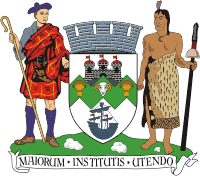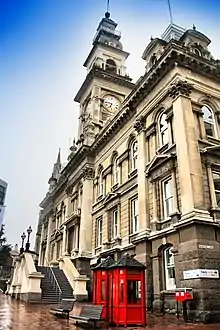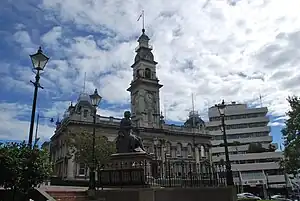Dunedin City Council
The Dunedin City Council (Māori: Kaunihera ā-Rohe o Ōtepoti) is the local government authority for Dunedin in New Zealand. It is a territorial authority elected to represent the 134,600 people of Dunedin.[1] Since October 2022, the Mayor of Dunedin is Jules Radich, who succeeded Aaron Hawkins. The council consists of a mayor who is elected at large, and 14 councillors elected at large, one of whom gets chosen as deputy-mayor. The councillors are elected under the Single Transferable Vote (STV) system in triennial elections, with the most recent election held on 8 October 2022.[2]
Dunedin City Council Kaunihera ā-Rohe o Ōtepoti | |
|---|---|
 Dunedin City Council coat of arms | |
Dunedin City Council logo | |
| Type | |
| Type | |
| Houses | Governing Body |
Term limits | None |
| History | |
| Founded | 6 March 1989 |
| Leadership | |
Deputy Mayor | Cherry Lucas |
| Structure | |
| Seats | 15 seats (1 mayor, 14 councillors) |
Political groups |
|
Length of term | 3 years |
| Elections | |
| Single Transferable Vote | |
Last election | 8 October 2022 |
Next election | October 2025 |
| Motto | |
| Maiorum Institutis Utendo | |
| Meeting place | |
 | |
| Municipal Chambers, in The Octagon | |
| Website | |
| dunedin | |
Council membership

2022–present
The current composition of the council is as follows:
| Name | Affiliation |
|---|---|
| Jules Radich (Mayor) | Team Dunedin |
| Bill Acklin | Independent |
| Sophie Barker (Former Deputy Mayor) | Independent |
| David Benson-Pope | Independent |
| Christine Garey | Independent |
| Kevin Gilbert | Team Dunedin |
| Carmen Houlahan | Independent |
| Marie Laufiso | Green Dunedin |
| Cherry Lucas (Deputy Mayor) | Independent |
| Jim O'Malley | Independent |
| Mandy Mayhem-Bullock | Independent |
| Lee Vandervis | Independent |
| Steve Walker | Labour |
| Brent Weatherall | Team Dunedin |
| Andrew Whiley | Team Dunedin |
2019–2022
During the 2019–2022 term the composition of the Council was as follows:
| Name | Affiliation |
|---|---|
| Aaron Hawkins (Mayor) | Green Dunedin |
| Christine Garey (Deputy Mayor) | Independent |
| Sophie Barker | Independent |
| David Benson-Pope | Independent |
| Rachel Elder | Independent |
| Doug Hall | Independent |
| Carmen Houlahan | Independent |
| Marie Laufiso | Green Dunedin |
| Mike Lord | Independent |
| Jim O'Malley | Independent |
| Jules Radich | Independent |
| Chris Staynes | Independent |
| Lee Vandervis | Independent |
| Steve Walker | Labour |
| Andrew Whiley | Independent |
2016–2019
During the 2016–2019 term the composition of the Council was as follows:[3]
| Name | Affiliation |
|---|---|
| David Cull (Mayor) | Independent |
| Lee Vandervis | Independent |
| Andrew Whiley | Independent |
| Aaron Hawkins | Green Dunedin |
| David Benson-Pope | Independent |
| Chris Staynes (Deputy Mayor) | Independent |
| Conrad Stedman | Independent |
| Doug Hall | Independent |
| Rachel Elder | Independent |
| Jim O'Malley | Independent |
| Kate Wilson | Independent |
| Mike Lord | Independent |
| Damian Newell | Independent |
| Marie Laufiso | Green Dunedin |
| Christine Garey | Independent |
2013–2016
During the 2013–2016 term, the composition of the Council was as follows:[4]
| Mayor | Dave Cull |
| Councillors – Central Ward | Hilary Calvert Richard Thompson Lee Vandervis Jinty MacTavish David Benson-Pope Aaron Hawkins Chris Staynes Neville Peat Doug Hall John Bezett Andrew Whiley |
| Councillors – Mosgiel-Taieri ward | Kate Wilson Mike Lord |
| Councillor – Waikouaiti Coast-Chalmers ward | Andrew Noone |
2010–2013
During the 2010–2013 term, the composition of the Council was as follows:
| Mayor | Dave Cull |
| Councillors – Central Ward | Bill Acklin John Bezett Fliss Butcher Neil Collins Paul Hudson Jinty MacTavish Chris Staynes Teresa Stevenson Richard Thompson Lee Vandervis Colin Weatherall |
| Councillors – Mosgiel-Taieri ward | Syd Brown Kate Wilson |
| Councillor – Waikouaiti Coast-Chalmers ward | Andrew Noone |
Community boards
The council has created six local community boards under the provisions of Part 4 of the Local Government Act 2002,[5] each with six elected members and one councillor appointed by the council:
- Strath Taieri Community Board
- Waikouaiti Coast Community Board
- Mosgiel-Taieri Community Board
- Saddle Hill Community Board
- West Harbour Community Board, and
- Otago Peninsula Community Board.
These community boards are intended to provide advice to the city council regarding the interests of the communities they represent.[6]
References
- "Subnational population estimates (RC, SA2), by age and sex, at 30 June 1996-2023 (2023 boundaries)". Statistics New Zealand. Retrieved 25 October 2023. (regional councils); "Subnational population estimates (TA, SA2), by age and sex, at 30 June 1996-2023 (2023 boundaries)". Statistics New Zealand. Retrieved 25 October 2023. (territorial authorities); "Subnational population estimates (urban rural), by age and sex, at 30 June 1996-2023 (2023 boundaries)". Statistics New Zealand. Retrieved 25 October 2023. (urban areas)
- "2022 Elections". Dunedin City Council. Retrieved 19 August 2023.
- "2016 – Dunedin City Council Final Results and Returns of Electoral Donations and Expenses". Dunedin City Council. Retrieved 31 March 2017.
- "Dunedin City Council Final Results". Dunedin City Council. Archived from the original on 23 September 2015. Retrieved 22 October 2013.
- "Local Government Act 2002 No 84 (as at 01 July 2017)". www.legislation.govt.nz. Retrieved 19 August 2023.
- "Community boards". Dunedin City Council. Retrieved 19 August 2023.